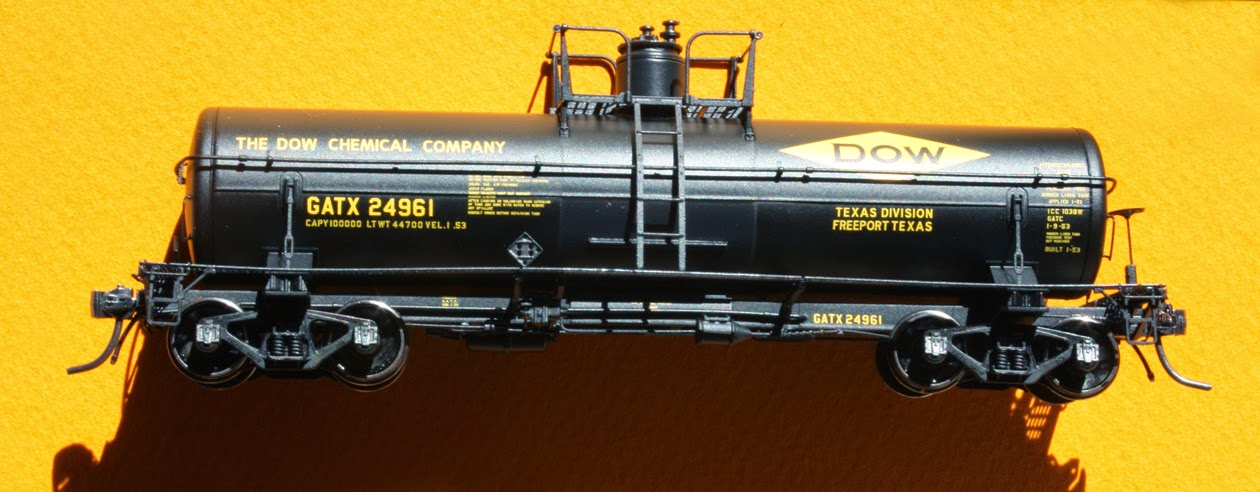Tangent Scale Models has just released an outstanding model of an acid tank car. Most acid cars were visibly distinctive in having a different design of dome, taller and narrower than the usual 2-percent dome (which means 2 percent of the tank volume). Acid cars were generally manufactured with a specific tank lining to resist a specific acid, such as rubber linings for hydrochloric acid, and accordingly were not used interchangeably for different acids. Each of these Tangent models is lettered for a specific acid. For information about all the cars in this first run, you can browse their website at: https://www.tangentscalemodels.com/ .
Tangent has modeled an 8000-gallon car, about as large as acid cars were in the transition era; in fact, due to the density of some acids, many cars were 6500 or 7000 gallons. Tangent’s model is a welded car, the dominant method of tank car construction after about 1950, so these models are really only suitable for post-1950 modelers. Here is a photo of one of the models, in phosphoric acid service and lettered for Stauffer.
I mentioned the distinctive acid dome. Here is a side view of the Tangent dome (a better view of the upper part of the tank with this Dow Chemical paint scheme is in the following photo; this is a hydrochloric acid tank).
The models are equipped with a representation of steel grid walkways and dome platforms, as was required for tank car construction after 1948, and these steel walkways are molded in a tough engineering plastic, permitting them to be reasonably close to scale size yet tough and durable. This high-angle view shows how good-looking they are. (You can click to enlarge.)
A couple of years ago, I kitbashed an acid tank car of 7000-gallon size, which differs primarily in the tank diameter, and the height of the dome. Here is that model, posed next to the 8000-gallon Tangent car, both lettered for Stauffer (my model is weathered, but the Tangent model shown is not yet weathered). If you would like to know how I made the 7000-gallon car, a full modeling description was published in Railroad Model Craftsman in the issue for January 2012, with additional comments in a blog post, at: http://modelingthesp.blogspot.com/2011/12/new-tank-car-article-in-rmc.html .
These 8000-gallon Tangent models doubtless look “too small” to many modelers, accustomed as we all have been to the Athearn “chemical” tank car. The Athearn model is about 11,000 gallons in size and thus a much larger car, and is also an insulated tank, making tank diameter even larger than implied by the gallonage. Here is a comparison of the Tangent model to a stock Athearn car.
The Athearn car, as many modelers know by now, has an immensely oversize valve bonnet and platform, but that is the not the point being made here, only a comparison of tank diameter and length.
It may occur to some that Tangent now has an excellent 8000-gallon welded tank, and a General American underframe to go with it. They can offer in the future different domes for a wide variety of other tank cars. Let’s hope that possibility is one that Tangent will want to pursue.
This Tangent product is a much-needed and very welcome prototype, distinctively different from most other tank cars, and because acids are among the most widely used chemical products shipped in tank cars, can find wide application in layouts set in all parts of the country. It is a superb model, and I endorse it without reservation.
Tony Thompson





You aren't kidding about these. Very pretty.
ReplyDeleteI picked up a Dow and a Stauffer a few days ago, and I haven't spent much time with them. I assumed the walkways were etched without really thinking about it, and I was surprised to read that they are plastic. When I stop to think about them, that makes sense.
I haven't set these next to the Tangent three-compartment tanks yet. That was (is) a nice model, but too distinctive to have more than one or two.
I'm sure you know this, but other readers may not realize that Tangent sells parts and sprues individually at reasonable prices. I'll be watching their website to see when the parts pop up for these new tanks. I could see some parts swapping in my future to upgrade some older models.
Maybe we're entering a golden age of tank car models? One can hope.
CJ
very nice!!
ReplyDeleteGreetings from Argentina!
http://retroautosminiatura.blogspot.com.ar/